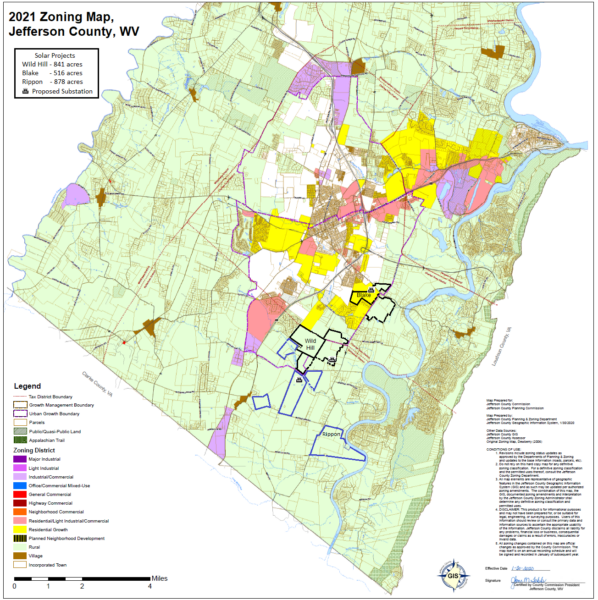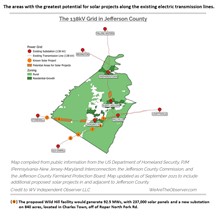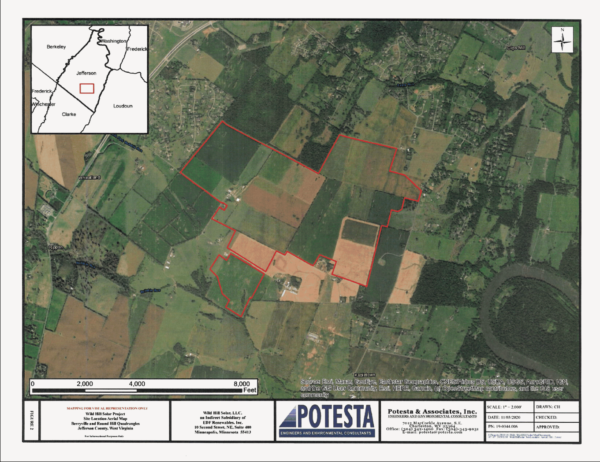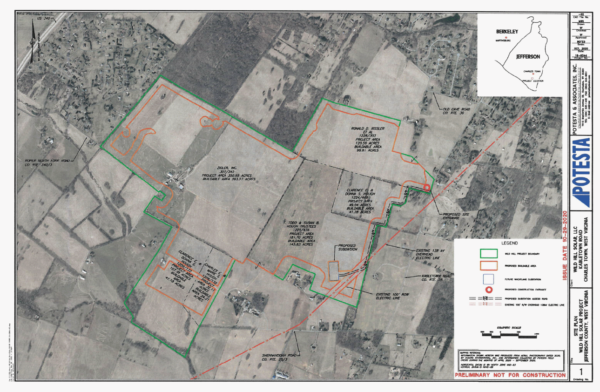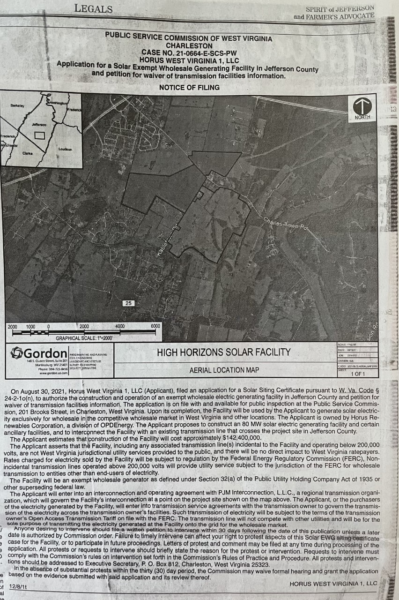12/8/22 –Third solar energy facility planned
During a workshop on 11/15/22, the Jefferson County Planning Commission approved the 878-acre Rippon solar project, making this the third Solar Energy Facility planned for development in Jefferson County.
The applicant, Torch Clean Energy is proposing a 99 MWac solar electric generating facility, which will consist of 215,000 solar panels, a new substation to connect the solar facility with the electric grid, and underground utilities. The project site has existing high voltage power lines running through the property.
The WV Observer, previously published a map representing the areas in the County most likely to meet the criteria to develop commercial-scale solar projects. The County Planning and Zoning department approved concept plans for three of the six sites:
Wild Hill (EDF Renewables) – 841 acres
Blake (Horus/OPD Energy) – 516 acres
Rippon (Torch Clean Energy) – 878 acres
Legal Status Countywide:
Several residents of Jefferson County have taken legal action against local county government related to recent decisions on the solar energy facility development.
County legal updates include discussion of the following pending lawsuits:
Board of Zoning Appeals:
- Jefferson County Circuit Court Case #CC-19-2022-C-81
(RE: ZTA22-01 Solar Energy Facilities) Rockwell v. JCPC, JCBZA and JCC
- Jefferson County Circuit Court Case #CC-19-2022-C-103
(RE: 22-4-CUP Blake Solar Energy Facility) Stone v. JCBZA
- Jefferson County Circuit Court Case #CC-19-2022-C-141
(RE: Rippon Solar Energy Facility / File 22-9-CUP) Rockwell v. JCBZA
12/8/22 – agenda packet – https://www.jeffersoncountywv.org/Home/ShowDocument?id=22918
Jefferson County Commission
- Discussion of legal issues and potential action regarding proposed Solar Text Amendment to the Jefferson County Zoning and Land Development Ordinance, File #ZTA22-01, including bonding, comprehensive plan, and related matters. Discussion of public hearing on proposed text amendment, review and consideration of amendment text, adoption of amendment and/or modification of amendment text and/or Planning Commission review and associated fees. Discussion of Jefferson County Circuit Court Civil Action No.’s 2021-C-33 through 37 and Jefferson County Circuit Court Civil Action No.’s 2021-C-46 through 50, Jefferson County Circuit Court Civil Action No. CC-19-2022-C-6, Jefferson County Circuit Court Civil Action No. 2022-C-81, and WV Supreme Court No.’s 21-0727, 21-0728, and 21-0731.
12/1/22 – agenda packet: https://www.jeffersoncountywv.org/Home/ShowDocument?id=22838
10/27/22 – Third Conditional Use Permit approved
The Board of Zoning Appeals, held a public hearing on 10/27/22, for the Rippon Energy Facility. A Conditional Use Permit was granted to operate a solar electric generating facility.
262 acres of the proposed 878-acre project are located within the Charles Town Urban Growth Boundary, where solar energy facilities are permitted by right.
It is important to note that 737 acres of the project lie in a rural/agriculture zone outside of the Urban Growth Boundary of the County.
According to §8-6-4a of the West Virginia Code, Urban Growth Boundaries (UGBs) are…
“an area around and outside the corporate limits of a municipality within which there is a sufficient supply of developable land within the boundary for at least a prospective twenty-year period of municipal growth based on demographic forecasts and the time reasonably required to effectively provide municipal services to the identified area.”
Urban Growth Boundaries (UGB) are the sections of Jefferson County where urban scale development is to be targeted over the planning horizon of Envision Jefferson 2035. The Jefferson County Comprehensive Plan, Envision Jefferson 2035 addresses a key concept of future land use and growth management to better influence the location of new development.
The Rippon project spans 9 rural/agricultural parcels along the Shenandoah River and Bullskin Run, on Old Shennandale Rd, Myerstown Rd, Kabletown Rd. and Dutch Hill Rd. in Charles Town.
“The subject parcels, comprised of 737 acres, are currently used for agricultural purposes, including cropland, hayfields, and pasture. The land is generally cleared land, but includes some trees along rock outcroppings, field boundaries, and along the Shenandoah River and Bullskin Creek.”
“Portions of the project site are located within the delineated floodplain area; however, all of the panels will be outside of the floodplain area and will comply with the 25-foot setback requirement from the edge.”
The project will consist of 215 thousand solar modules, inverters and a new substation to connect the 99 MW solar facility with the electric grid of existing high voltage power lines running through the properties.
Review the request for a Conditional Use Permit, (as defined in the county Zoning Ordinance,) to operate a Solar Energy Facility, approved by the Board of Zoning Appeals, agenda packet, 10/27/22, page 93: https://www.jeffersoncountywv.org/Home/ShowDocument?id=22612
9/28/22 – Two large-scale solar energy facilities move two steps closer to being constructed in Jefferson County
Approval was granted by the Board of Zoning Appeals for the conditional use permits, for EDF Renewables’ “Wild Hill” and Horus’ “Blake” solar projects, following a public hearing, and the Planning Commission subsequently accepted the concept plans.
Both projects are in Charles Town, on 841 and 516 acres respectively, off Kabletown Road and Roper North Fork Rd. next to the Cloverdale subdivision. To locate the sites in Jefferson County – near existing high voltage transmission lines – solar developers entered into 30-year land use lease agreements with multiple local property owners. In 2021, the Public Service Commission of WV granted siting certificates to these solar exempt wholesale generators.
Planning and Zoning staff noted an application for a third solar installation is expected to be received and scheduled for a workshop before the end of the year.
On 9/1/22, the County Commission passed a motion to accept the Residential, Commercial and Solar Farm/Facilities building permits fees as recommended by the Chief County Engineer with the understanding the fee will be reviewed in a year. The motion seconded and unanimously approved.
Utility Scale Solar Farm/Facility fee: $13,500. minimum for 5 Megawatts or less + $1,400. per additional MW; plus $350. base fee and $0.25/sq-ft for appurtenant structures.
8/9/22 – BZA and PC approve the Blake Solar Project Concept Plan
The BZA stipulated the following under the Conditional Use permit, applicable to 270 acres of the project:
– the previously platted 179 residential lots on the Thorn Hill plat are to be merged as a single parcel,
– as offered by the developer, a supplemental 150’ buffer is to be installed from any existing offsite residential structure, and
– development is to be consistent with all federal, state and local regulations.
6/16/22 – JCC votes 4-0 to approve the proposed Solar Energy Facilities zoning ordinance text amendment
The Jefferson County Commission held a public hearing on Thursday, June 9th to receive input on the recommendation put forward by the Jefferson County Planning Commission regarding the proposed Solar Energy Facilities zoning ordinance text amendment. After the hearing, a motion was made to adopt the text amendment. However, the motion failed with a 2-2 vote. On June 16th during the regularly scheduled meeting the text amendment was reconsidered and passed 4-0.
4/12/22 – JCC reaches a settlement addressing the community’s concerns to amend the Comprehensive Plan amendment and rewrite the zoning ordinance
Since May 2020, the Jefferson County Planning Commission (JCPC) has attempted to draft a zoning ordinance to allow solar energy facility development in the County. Residents filed
On April 12th, the JCPC had a meeting to discuss these changes to include a Conditional Use Permit (CUP) process for solar energy facilities outside of the Urban Growth Boundary (UGB) and Preferred Growth Area (PGA). The previously designated principle permitted use, or by-right land use, will remain within the smaller UGB and the PGA areas (as shown on this map).
The changes incorporating a Conditional Use designation will allow for evaluation of each project in rural and residential districts with avenues for public input that takes into account the concerns of local residents. CUP permits must consider if “the proposed use is compatible in intensity and scale with the existing and potential land uses on the adjoining and confronting properties, and poses no threat to public health, safety and welfare.” Future CUP project applications, if approved to proceed by the Board of Zoning Appeals, will also be required to provide a concept plan of the project to the Planning Commission.
Thank you to everyone who participated in the public hearings and provided comments on the Solar Energy Facilities draft zoning ordinance and amendments to the comprehensive plan.
3/12/22 – HB 4553 died in the Senate Energy, Industry, and Mining Committee
On the last day of the WV Legislative Session, HB 4553 died in the Senate Energy, Industry, and Mining Committee. Local government will retain the right to decide where solar exempt wholesale generators will be permitted. Thank you to everyone who urged your delegates to vote against this bill.
2/3/22 – JCC Public Hearing on PC’s recommendations & HB 4553 introduction to State Legislative Session
The Jefferson County Commission held a public hearing concerning the Planning Commission’s recommended amendment to the Envision Jefferson 2035 Comprehensive Plan.
In addition to the draft amendment, HB 4553 was introduced in the state’s legislative session. This bill would allow exempt wholesale generators to be a permitted use in any zoning district anywhere in West Virginia. If passed, this bill will override local zoning ordinances within county jurisdiction. We encourage you to email or call your Delegates, urging them to vote against HB 4553.
12/14/21 – PC votes to recommend proposed changes to the Jefferson County Commission
On December 14th, the Jefferson County Planning Commission voted to recommend all proposed changes in the amendment to the Jefferson County Commission.
12/14 agenda packet: http://www.jeffersoncountywv.org/Home/ShowDocument?id=20717
Pg. 89 summarizes the sections proposed to be changed.
12/7/21 – PC Public Hearing on proposed Comprehensive Plan amendments
In recent months, the Jefferson County Planning Commission has been preparing a draft amendment of the Envision Jefferson 2035 Comprehensive Plan to permit large scale solar facilities in the rural and residential growth districts. View the draft amendment here.
If the draft amendment to the Comprehensive Plan is approved in the current format, more projects that provide limited benefits to the local community will follow, effectively turning our county’s farmland into solar industrial installations. The Jefferson County Planning Commission held a public hearing on Tuesday, December 7th at 7 pm to discuss the proposed changes to the Envision Jefferson 2035 Comprehensive Plan.
A list of the proposed changes in the amendment can be viewed here: Summary of Comp Plan amendments 121421 packet
A recording of the 12/7 hearing can be viewed here.
A recommendation on the changes to the Comprehensive Plan to include solar energy facilities was tabled on 12/7/21, while the JCPC reviews materials received from the public. (Commissioners Steve Stolipher and Shane Roper have recused themselves from the solar related items.)
The Commissioners decided to leave the public comment period open for the proposed amendments, until their next meeting on 12/14. Send comments to planningdepartment@jeffersoncountywv.org
Farmland is desirable to solar facility developers due to its flat topography and proximity to the existing electric grid. This map shows the regional electrical transmission lines crossing through Jefferson County and projects currently under consideration for solar development.
10/12/21 – PC finalizes the proposed language for the Comp Plan
The Planning Commission reviewed the proposed language to be amended in the Comprehensive Plan to determine if any further revisions are required. The PC entered executive session to receive counsel concerning the Comp Plan amendment process, then moved to accept the edits presented by staff and to move forward with the public hearing scheduled for 12/7/21.
Pg. 99 – http://www.jeffersoncountywv.org/Home/ShowDocument?id=20396
10/5/21 – PC review of the draft Comp Plan amendment
Without further public comment, the Planning Commission provided feedback to staff on how to incorporate the recommendations into a single draft for consideration at a Public Hearing.
http://www.jeffersoncountywv.org/Home/ShowDocument?id=20380
9/28/21 – PC Public Workshop for Comp Plan overview
http://www.jeffersoncountywv.org/Home/ShowDocument?id=20360
A special meeting was held to receive public input on amendments to the Envision Jefferson 2035 Comprehensive Plan (approved 1/14/15) with a particular focus on “Economic Development, Employment and Infrastructure Element” which relate to the Alternative Energy subsection under Infrastructure the “Agricultural and Rural Economy.” Although advertised as a round table discussion, the meeting was comprised of the PC receiving public input by allowing comments within three minutes per participant.
9/2/21 – JCC moves to request Comprehensive Plan changes
http://www.jeffersoncountywv.org/Home/ShowDocument?id=20390
New business included a discussion of [a] potential amendment of Jefferson County Comprehensive Plan to include provision for solar facilities.
• Motion by Ms. Jackson to request the Planning Commission to consider amending the Comprehensive Plan to clarify solar facilities be recognized as a principal permitted use throughout the rural and residential districts as quickly as possible, as allowed under 8a-3-11. Motion seconded and passes on a vote of 3-1 with Ms. Tabb opposing and Mr. Stolipher abstaining.
Several Jefferson County residents filed a lawsuit against the County and Planning Commissions regarding the illegal approval of a zoning ordinance allowing solar energy facilities. They WON, invalidating the Commissioners amendment. In response, added to the JCC agenda for 9:30 AM on September 2nd, is discussion of legal issues regarding solar and a “potential amendment of [the] Comprehensive Plan to include provisions for solar facilities.” It looks like the Commissioners are trying to move the goal post and amend the Comprehensive Plan to circumvent the ruling of the Court.
6/8/21- JCPC Motion to approve the Wild Hill Concept Plan passes unanimously
The concept plan submitted by Wild Hill to the Jefferson County Planning Commission was discussed during a workshop held on June 8, 2021. During the workshop, Mr. Steve Stolipher made a motion to approve the Concept Plan as presented; which was seconded by Jack Hefestay. The motion passed unanimously. View the agenda, which includes Wild Hill’s concept plan here.
4/12/21- The JCC approved the Solar Zoning Ordinance Amendment
On April 12th, The Jefferson County Commission ignored the vast majority of the public input they received, immediately granted the wishes of a developer and approved the Solar Zoning Ordinance Amendment with a few changes, none for the better. This amendment allows Solar Energy Wholesale Generator facilities to be installed as a Principal Permitted Use on over 80% of Jefferson County’s land surface. The setback from adjoining property lines was reduced from 100 feet to only 50 feet, with vegetation as a buffer. Also decided was that no decommissioning or bonding agreements need to be in effect at this time, which is a complete reversal of the Commission’s stance from last October. The vote to approve was 3 to 1, with Commissioner Jane Tabb voting against and Commissioner Stolipher recusing himself due to possible conflicts of interest.
Josh Compton’s first motion to approve the amendment was halted, following Commissioner Hudson’s suggestion that maybe they should hear from Legal Counsel first. After the executive session, Compton revised his motion to approve. This Commission got around W.Va. Code that zoning must be consistent with the comprehensive plan by declaring that, “there had been major changes of an economic, physical or social nature which were not anticipated when the comprehensive plan was adopted and those changes have significantly altered the basic characteristics of the area.” No identification of what changed was given.
In addition to ignoring the citizen comments calling for Conditional Use approval of each project versus Principal Permitted Use, Compton accused them of, “being against everything and wanting to delay and delay.”
The Amendment is to go into effect immediately on April 13. One might wonder, why the rush to put the ordinance into effect? A lawsuit had been filed against the Planning Commission’s earlier advancement of the Ordinance with a court date set for the 14th. It seems obvious why they hurried the motion.
What happened is, sadly, not an aberration in our local government, but proof the elections have consequences and the vigilance of the citizens must be constant. Supporting JCV is one way to help, but every citizen has to be involved to have good government.
3/9/21- The Jefferson County Planning Commission votes that solar energy facility amendment is consistent with the Comprehensive Plan
Jefferson County Vision formally intervened on the Wild Hill Solar EWG and an evidentiary hearing was held on January 29, 2021. On February 11, 2021 the PSC awarded the site certificate to Wild Hill with several conditions. The ruling can be acquired here: http://www.psc.state.wv.us/scripts/WebDocket/ViewDocument.cfm?CaseActivityID=560640&NotType=%27WebDocket%27
At the local level the Jefferson County Planning Commission voted to approve the solar amendment on March 9, 2021, stating that it was consistent with the Comprehensive Plan.
The approved amendment regarding permitted use was the same as originally proposed by the Jefferson County Commissioners (JCC), which was challenged in the courts. At the time of the court challenge Jefferson County Commissioners vacated the amendment presumably for legal reasons. The Planning Commissioners’ approved amendment now returns to the JCC for review and action. JCV will provide updates as they become available.
On March 9th, the Jefferson County Planning Commission (PC) voted that the solar energy facility amendment as previously proposed was consistent with the Comprehensive Plan and will advance the recommendation to the JCC. Before the vote, Nathan Cochran, the county attorney, immediately recommended that the PC go into Executive Session to receive legal advice on the potential for litigation and “some issues.” Mr. Cochran provided the PC findings of fact and conclusions of law, which they accepted to support the decision.
Very little public discussion occurred, other than a statement by President Mike Shepp as to what influenced the decision. The statement was to the effect that solar facilities allowed as a permitted use is consistent with the Comprehensive Plan adopted in 2015 to the extent that circumstances have changed due to economic, physical and social situations that were not anticipated, and these have substantially altered the area.
In effect, the PC approved the same amendment that the County Commission (JCC) had vacated and returned to the PC for further review and consideration. The amendment will now be sent to the JCC for its review and action. Stay tuned for further developments.
2/23/21- The Jefferson County Planning Commission holds special meeting on Zoning Amendment Proposal
On February 23rd, the Jefferson County Planning Commission held a Special Meeting on the Zoning Amendment Proposal to allow Solar Energy Facilities in Jefferson County.
The special meeting opened with the reading of the solar facility text amendment, the only item on the agenda. Before discussion, Counsel Nathan Cochran, recommended the PC enter executive session to receive advice on potential legal issues surrounding the zoning ordinance.
After the 20-minute session, several components of the text amendment were reviewed between Commissioners and staff, including:
The buffer screen, either a vegetative or opaque fence, placed between the facility and any residences, churches or historical resources, etc., within a 200’ radius and how it corresponds to the 100’ setback from property lines.
A decommissioning plan including surety – to return a site to its original condition covering any cost associated with removing panels and accessories – is a requirement that is still being drafted. This agreement is the responsibility of the Jefferson County Commission (JCC) and Counsel informed members he anticipates the document will be provided to the JCC and visible to the public before the JCC would reach a decision on the amendment.
Still unresolved, was the question of compatibility with the 2014 Comprehensive Plan. In its proposed form, the ordinance allows for facilities as a principal permitted land use vs. a conditional use process. The meeting was adjourned following a motion by President Mike Shepp, and seconded by Jack Hefestay, for a legal evaluation to be received before the amendment is further considered.
Beforehand, a public hearing was held by the Planning Commission on February 9th to reevaluate the zoning amendment proposal to allow Solar Energy Facilities in Jefferson County. This action was taken after the County Commission reversed its previous approval and advised the PC to further review the recommendation.. The hearing had a great turnout with sixty participants and nineteen people who gave comments.
The predominant request of most speakers was for the specification of a Conditional Use process to review each solar project opposed to the permitted land use throughout 80% of the County. Support was expressed for careful consideration of project size and standards if renewable energy expands, helping diversify local agricultural operations and create job opportunities.
After 45 minutes of public comments, the Commission entered into executive session for 45 minutes at the advice of Legal Counsel to assess the matter and potential for litigation. Upon return to the meeting, without further debate, a motion was made to postpone action on the amendment until a February 23rd Special Meeting while the Commission considered the “well thought and well-intentioned comments from the public.”
CLEAN ENERGY VS CLEAN GOVERNMENT
Jefferson County Vision previously provided a notice of the first application before the Public Service Commission to site a solar energy facility in Jefferson County. Our mission is to fight for a clean environment and transparent government. We see the proposed installation of a Solar Exempt Wholesale Generator (EWG) here as a conflict between these two goals. This information is provided to explain what an EWG is, our position on the installation of facilities in Jefferson County, and recommendations of what citizens can do.
DEFINITION: A Solar EWG facility – as determined by the Federal Energy Regulatory Commission – generates electricity solely through solar photovoltaic or other solar methods, includes only interconnecting transmission lines and is not owned by a utility. The term “exempt” in the designation refers to exemptions from the Public Utility Holding Company Act of 2005. The statutory definition of an EWG requires that an EWG be exclusively in the business of owning or operating, or both owning and operating, all or part of one or more eligible facilities and selling electric energy at wholesale.
The first EWG application, recently approved by the Public Service Commission, is Wild Hill (CASE Number 20-0845-E-SCS-PW, www.psc.state.wv.us.) A virtual public comment hearing was held on January 28, 2021. This one installation involves 795 acres and is located between Kabletown Road and Route 340, adjacent to the Cloverdale Heights subdivision. There are several more EWGs in the pipeline for Jefferson County. With the recent recommendation of Zoning Amendment ZTA19-03, EWGs would be allowed “by right” on up to 80 percent of the land in Jefferson County.
Wild Hill Project Site Location
OUR POSITION: JCV supports renewable energy. While renewable energy, whether by solar, wind or other methods is not perfect, we believe it is better for our environment than using fossil fuels. In addition, renewable energy can be an economic boon as more companies demand access to renewable energy. However, we do not support our county’s farmland being turned into solar industrial installations that provide limited benefits to the local community. These installations are not “solar farms” but large-scale power generation facilities. Unlike public utilities, EWGs have no consumers, and all electricity generated would be for wholesale, most likely to out of state entities. We support reasonable development of EWGs that take into account the opinions and concerns of the citizens that will be having them as neighbors. Recent changes to our zoning ordinances have paved the way for what amounts to being another extractive industry to be established in West Virginia with virtually no local control that could turn thousands of acres of prime farmland into utility sites. How we lost local control is an example of good intentions waylaid by bad government.
HOW WE GOT HERE: In December of 2019, a landowner came to the Jefferson County Planning Commission with a request for a Conditional Use Zoning change in the rural district. This meant that he was requesting a zoning change so solar facilities could be installed on his farmland. The request was taken into a private working group away from attendees and came out 5 months later recommended for “permitted use” of solar energy facilities. This meant that large-scale solar utility installations would be allowed “by right” on about 80 percent of all property in Jefferson County. This alarmed many citizens, not just JCV, and the Jefferson County Commission (JCC) had concerns as well.
This summer the JCC held workshops and a hearing where every person that spoke, including JCV, supported solar energy, but not all supported the permitted use. On October 1, 2020 the JCC approved the zoning amendment. Early in November, Wild Hill Solar, LLC applied for a solar siting certificate with the Public Service Commission (PSC). The advertisement for Wild Hill was printed on November 18, two days after the revised zoning ordinance was supposed to have gone into effect.
However, on November 12 a group of citizens filed suit against the JCC’s passing of the zoning amendment and received a temporary restraining order (TRO) against the amendment. The TRO was extended until a continuation hearing that was held by Circuit Court Judge, The Honorable Debra McLaughlin on December 15.
On the 10th of December a settlement was reached in this case and the Jefferson County Commission vacated their approval of the zoning amendment and returned it to the Jefferson County Planning Commission. JCV applauds the action these citizens took on behalf of all of us. At the January 12, 2021 meeting (agenda packet, including the December 10th JCC action) the Planning Commission voted to schedule a Public Hearing on February 9, 2021 to receive public input on the draft text amendment ZTA19-03.
And who is Wild Hill?
Wild Hill Solar, LLC is a Delaware corporation that was registered in WV in May of 2020. It’s primary address is in San Diego CA. Wild Hill is indirectly owned by EDF Renewables, which is in turn owned by a French company that is largely owned by the French Government. It is evident that profits from the EWG will not stay in West Virginia. While the total cost of the project is estimated at $125M, WV’s electric utility is a fully regulated industry and without Power Purchase Agreements, residents will be unable to directly benefit or contract for use of power. Operation of the facility after 1-year of construction will only require around four employees.
Wild Hill Project Site Plan
WHAT YOU CAN DO: There are still unanswered questions concerning the proposed installation and thus JCV recommends the following actions:
Examine the amendment. You can review a copy of the draft amendment to the zoning ordinance, which includes the proposed revisions to the Stormwater Management Ordinance, here.
Stormwater revisions require 1) vegetal cover restoration without chemical fertilization; 2) panel modules situated on mild slopes allowing the passage of runoff underneath; and 3) an erosion and sediment control plan.
Write the Jefferson County Commission. The Planning Commissioners approved amendment now returns to the JCC for review and action. If you have any questions, email info@jeffersoncountywv.org.
Familiarize yourself with the scope of the Wild Hill application at: http://www.psc.state.wv.us/WebDocket/default.htm
-Search by the Case Number 20-0845-E-SCS-PW ; Choose Activities to view associated documentation. The full site application is the third document from the bottom and is a very large file.
Jefferson County Vision’s petition to intervene was accepted by the PSC and a virtual evidentiary hearing was held on January 29, 2021. JCV took the step of intervening because it is only through intervention that evidence may be discovered and presented to the PSC for formal review. We thank all those who exercised their rights by submitting comments.
Recommendations that were included in comments to the PSC:
-PSC rules require that a formal hearing be held unless waived, not waived unless protest is substantial;
-PSC should not have ignored the opinions of Staff in waiving solar siting rule requirements of transmission line support drawings in the application;
-The information in the advertisement was unclear and unreadable;
-This facility serves little benefit to the people of Jefferson County and an unknown amount of tax income. The economic impact study is severely flawed in many ways. (pg 92-104);
-The permitted use of solar facilities zoning for the rural land was under litigation; required local permits may not be forthcoming;
-Affidavit of Emily Dalager (EDF Project development Manager) has an incorrect date for start of operations and her timeline for construction contradicts the plan of Environmental Consultants Potesta & Associates in removal of trees;
-There is no proof that Wild Hill has provided information to adjacent landowners as noted by the State Historical Program Officer (pg 30-31 of the application) This notification should be done before the requested hearing to allow for those citizens most affected to be aware of what is occurring in their backyard.
Horus High Horizons Project
A public notice has been advertised by Spain’s OPDEnergy, operating as Horus West Virginia 1, LLC for the development of the High Horizons solar facility. The 80 MW facility would be located on 506 acres with a new substation constructed on the south side of Route 115 adjacent to the existing high voltage power lines.
Horus High Horizons Project Site Location
The WV Public Service Commission is accepting public comments and letters of protest on the project until 1/7/22.
To submit comments online, search by Case Number 21-0664-E-SCS-PW :
http://www.psc.state.wv.us/scripts/onlinecomments/SelectFormalCase.cfm
Or send by mail, to the: WV Public Service Commission –
Executive Secretary, PO Box 812, Charleston, WV 25323.
The application documents for the solar siting certificate for the proposed High Horizons facility, can be accessed on the PSC website at:
http://www.psc.state.wv.us/scripts/WebDocket/tblCaseActivitiesList.cfm?CaseID=79552
Zoning and Land Development Amendment
Background
Ordinance #ZTA19-03 to allow solar energy facilities consisting of photovoltaic panel technology to process as a principal permitted land use was proposed by the Jefferson County Planning Commission to the Jefferson County Commission (JCC).
Click here to view the timeline, supporting documentation, presentations and drafts of the amendment on the Planning Commission website.
Solar renewable energy facilities site development standards must be provided in a concept plan including screening, fencing and decommissioning large arrays of photovoltaic panels, as defined in the amendment. In response to the proposed solar Zoning Ordinance, the County Engineering department recommended revisions to the Jefferson County Stormwater Management Ordinance, which will be addressed after the solar facilities amendment.
The JCC held a public hearing virtually (online) on file #ZTA19-03, an amendment to the JC Zoning and Land Development on Friday, September 11, 2020.
JCV’s recommendations can be found below, or for a shortened version, you can download this PDF guide.
Our Recommendations
JCV recommends the County Commission revise the zoning ordinance guidelines modifying the proposed principal permitted use to a conditional use process.
Consider these factors:
A requirement for minimum or maximum acreage is undefined.
It is unknown how many facilities are planned, or their size or location.
Principal permitted and conditional land use table (page 17) recommended to be modified to include Solar Energy Facility, in the Jefferson County Zoning and Land Development Ordinance.
Large-scale solar utilities by right would be allowed as long as the developer’s concept plan incorporates the text amendment guidelines.
The facility construction could include accessory components of inverters, transformers, and connections to transmission lines and substations, following local, state and federal permitting regulations.
In proposal #ZTA19-03, as a principal permitted use, solar facilities could be located by right within 80 percent of county land zoned general commercial, highway commercial, light industrial, major industrial, rural, residential growth, residential-light industrial-commercial, and industrial commercial.
JCV recommends that as part of the conditional use for development, an environmental impact assessment is conducted and includes appropriate soil samples (borings) and geotechnical analysis.
Suggested conditional use requirements include: documentation of surrounding archaeological, historical and wetland designations; documentation of flood risk; documentation and reporting of identified sinkholes; documentation on loss of wildlife and species habitat; documentation of impacts on surrounding property owners including value, viewshed, noise and light.
A conditional land use may be permitted in a particular zoning district only after review by the Board of Zoning Appeals and upon issuance of a conditional use permit, subject to requirements of each district and/or other requirements of the Zoning and Land Development Ordinance.
The amendment defines these main guidelines that a large-scale solar installation of photovoltaic panel technology must meet:
Screening. Solar panels must be set back 100 feet from all external/perimeter property lines and from the edge of any state road. Accessory components require 25 feet setback from the perimeter. A 20-foot buffer screen (vegetative or opaque fencing) is required when panels are located within 200 feet of a residence.
Fencing. A security fence between 6 to 10 feet with secured gates shall be erected around the operating areas of the facility.
Decommissioning. An outline of the lease duration and plan for proper removal and disposal of the panel system, mounting structures and the reasonable restoration of real property must be approved. The facility must post surety to enable the decommissioning completion.
The development of alternative energy can be viewed with benefits and disadvantages as Jefferson County pursues the creation of and use of a variety of energy sources (including renewable energy) within the County while converting rural land to non-agricultural uses. The form and types of development that take place in the rural environment should be respectful of the rural culture and historic nature of the community.
Guiding Development Decisions
From Jefferson County’s Comprehensive Plan, Envision 2035, Appendix D – Goals and Objectives:
Goal #10: Maintain and Enhance Community Services and Infrastructure Capacity for Water, Sanitary Sewer, Storm Sewer, and Other Utilities; and Enable the Provision of Orderly and Efficient Services and Advanced Technologies
Objective #9: Encourage the creation of and use of a variety of energy sources (including renewable energy) within Jefferson County in ways that respect the character of the County.
From Jefferson County’s Stormwater Management Ordinance:
In 2014, Jefferson County adopted a new stand-alone Stormwater Management Ordinance that effectively regulates the quantity of stormwater generated by local development. This includes standards related to water quality and provisions for low impact design stormwater provisions.
These standards help to protect, maintain, and enhance the environment of Jefferson County and the public health, safety, and general welfare of the citizens of Jefferson County by controlling discharges of pollutants to Jefferson County’s stormwater system, and maintain and improve the quality of the receiving waters into which all stormwater flows, including, without limitation, lakes, rivers, streams, ponds, wetlands, and groundwater of the community.
Additional Information
A copy of Jefferson County’s Comprehensive Plan, Envision 2035, and the Future Land Use Planning Guide is available here.
Jefferson County’s Stormwater Management Ordinance is available here.
News
The Observer, Feb/March 2021 – WV Independent Observer LLC
https://wearetheobserver.com/wp-content/uploads/2021/02/21-03-Observer.pdf
The Observer, Observer Map and Connecting Solar to the existing grid https://wearetheobserver.com/connecting-solar-to-the-grid/
WV Metro News, 01/29/21 – PSC considers evidence concerning large solar energy project in Jefferson County
WV Metro News, 01/28/21 – Public Service Commission to decide on large solar energy project planned for Jefferson County
The Observer, https://wearetheobserver.com/solar-in-jefferson/
The Observer, 7/30/20 – Perspectives from a Local Solar Professional: https://wearetheobserver.com/perspectives-from-a-local-solar-professional/
The Observer, 9/1/20 – Sparking A Conversation: Local Farmers Discuss Large-Scale Solar Development: https://wearetheobserver.com/sparking-a-converstation/
Jefferson County Development Authority, 08/19/20 – JCDA recommendations on alternative energy amendment. Page 89 http://www.jeffersoncountywv.org/Home/ShowDocument?id=18801
The Journal, 08/06/20 – Commissioners mull solar facilities in Jefferson County, public hearing set for Sept. 11: https://www.journal-news.net/journal-news/commissioners-mull-solar-facilities-in-jefferson-county-public-hearing-set-for-sept-11/article_5200d0f0-81e5-5df0-a244-74dbea9b3f84.html
The Journal, 05/06/20 – Jefferson Co. Planning Commission approves solar energy text amendment for public comment: https://www.journal-news.net/journal-news/jefferson-co-planning-commission-approves-solar-energy-text-amendment-for-public-comment/article_cb1fde11-c349-572e-9411-c4899a24dbc1.html
Spirit of Jefferson, 8/26/20 – EXPERTS: Few Jefferson County sites can accommodate solar farms: http://www.spiritofjefferson.com/news/article_ebbbebec-e71a-11ea-a0bf-cbc866ea69b0.html
Spirit of Jefferson, 8/19/20 – Commissioners continue raising questions on solar farms: http://www.spiritofjefferson.com/news/article_697d4830-dca0-11ea-b096-37db25cf5340.html
Spirit of Jefferson, 7/1/20 – County planners give solar farms a favorable nod: http://www.spiritofjefferson.com/news/article_20731858-bbae-11ea-ab0c-c730a2eae913.html
Sierra Club, 01/20 – Clean Energy Works in West Virginia: https://www.sierraclub.org/sites/www.sierraclub.org/files/blog/2130%20Clean%20Energy%20Works%20in%20West%20Virginia_05_web%20%281%29.pdf
The Nature Conservancy -Solar Development in WV, A pathway to a brighter economic future: https://www.nature.org/content/dam/tnc/nature/en/documents/solar-in-WV.pdf


